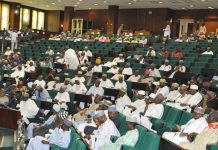The Independent Corrupt Practices and Other Related Offences Commission (ICPC) accused Federal Capital Development Authority (FCDA) officials of conspiring with members of the Real Estate Developers Association of Nigeria (REDAN) to defraud beneficiaries of the territory’s mass housing scheme yesterday.
In his submission to the investigative hearing on the operations of real estate developers in the FCT, ICPC Chairman, Prof Bolaji Owasanoye, claimed that the Federal Capital Territory Administration’s (FCTA) Land Department was conspiring with REDAN to defraud Nigerians in the territory.
He stated that his Commission had received several petitions and complaints from the real estate sector, off-buyers, developers, bothering on forgery, non-delivery of projects, marketing of fake land, fraudulent allocation, and government refusal to pay fair values for acquired land, among others.
Even as the House of Representatives charged the country’s security agencies with stepping up their efforts to apprehend perpetrators of all the ongoing shady practices in the real estate sector.
The ICPC president claimed that the FCDA has refused to clean up the real estate sector despite knowing about the shady practices and “looking the other way.”
According to the Chairman, the developers collected massive amounts of land with the agreement to pay counterpart funding and build houses for intending Beneficiaries, only to turn around and sell the land to the highest bidders.
Read Also: Corps members refurbish abandoned boreholes in Osun community
Owasanoye confirmed that corrupt public officials were using real estate to conceal ill-gotten wealth.
He requested that land title registration be made mandatory in order to identify the true owners of estates and prevent public officials from hiding behind third parties in order to acquire illegal properties.
According to the ICPC boss, many of the estate houses in Abuja were actually used for money laundering, which explains why the houses were left vacant even years after they were completed.
“Since its inception, the ICPC has received a number of petitions.” Despite the fact that we have not compiled the numbers pertaining to land issues,
“However, we have received a number of petitions from stakeholders in the real estate and housing sectors, off-takers, prospective buyers, and the general public regarding the behavior and antics of real estate developers within the FCT and sometimes outside the FCT on this very important subject.”
“The nature of these complaints and petitions varies. They are concerned with forgery, cloaning of land documents, double or multiple land allocations, allocation of land without the minister’s approval, revocation of land title without due process, non-delivery of projects, embezzlement of sourced capital, land racketeering, the use of land syndicates and speculators, marketing of fake layouts, fraudulent allocation of land, inordinate delay in processing of land documents for those who subscribe to their projects, and general nonsense.
“In addressing some of the issues raised in the petitions forwarded to the ICPC, we have successfully investigated and prosecuted some errant public officials and their collaborators, including staff of the Federal Capital Development Authority, Civil Defence, persons who abuse public trust, fraudulent real estate development operatives, and other ancillary people, who have further deepened the FCT’s mass housing gap.”
Read also: Kogi tackles the EFCC over the controversial N20bn loot
“Our investigations have resulted in the recovery of assets and funds that were either diverted or retrieved in the public interest.” In some cases, we simply made certain that the projects under consideration were delivered to the beneficiaries who had paid for them.
“Further to the foregoing, in 2010 and 2011, the Federal Government conducted a systems study and review of mass housing delivery in the FCT, where it was discovered that members of the Real Estate Developers Association of Nigeria (REDAN), who had been allocated huge plots of land for mass housing development in the FCT in collaboration with the Federal Government through the Federal Mortgage Bank and its responsibility to provide infrastructure upon which the allocations were made to them, and These developers failed to pay counterpart funding and deliver infrastructure to the project site, instead offering and selling plots to the highest bidder, in violation of policy.
“The FCDA rarely sanctioned some of these abuses.” In other words, despite knowing about the abuses, the FCDA chose to ignore them. The effect of REDAN members’ actions, of course, is that low and middle-income earners are supposed to be direct beneficiaries of the NHF because some money is deducted from our paychecks as a contribution to the NHF. They were denied housing because the plan and objective were completely undermined by the REDAN collaborators’ deceptive and fraudulent approach, because those beneficiaries could not even secure housing allocation, which is the basis for accessing the fund. The estates became the exclusive preserve of society’s wealthy.
Read Also: Why Nigeria Loses Over $2.9bn Per Year From Tax Breaks for Multinational Corporations – CISLAC Executive
“The subsequent pressure this places on low and middle-income earners is that it becomes a push factor for public sector corruption, as public servants desperate for their own homes subvert processes, government policies, and abuse their office for private gain in order to meet the desire for decent housing.”
“Furthermore, some members of REDAN obtain funds from the Federal Mortgage Bank for mass housing but divert those funds to build private estates, which are then sold at exorbitant prices to the general public, excluding public officers, who are the main and intended beneficiaries of the Federal Mortgage Bank’s projects and structures, as well as its policies and mandates.” Such public officials are unable to afford the high prices of such homes. It should be noted that, according to the original concept of the government’s mass housing policy, developers are supposed to profile and forward names of allottees to FCDA in order for the agency to issue a certificate of occupancy. In practice, however, developers do not follow these policies, and subscribers are frequently left at their mercy, holding only letters of allocation rather than a proper title to land.
“The ICPC’s intervention in this sector has resulted in recoveries on behalf of some allottees for FMB, FCDA, and, on occasion, other stakeholders.”
“In a similar vein, corrupt public officials use real estate investment as a vehicle for concealing ill-gotten wealth and laundering money.” To conceal the illegal origin of funds, public officials acquire estates under pseudonyms.
“This is made possible by a lack of proper documentation, the registration of titles to land and estates in the country, and the failure to enforce beneficial ownership standards.” A tour of Abuja, particularly the metropolis and the central area, would reveal a plethora of estates that are built but unoccupied. I don’t think any investor would be interested in such properties if they were built with funds borrowed at market rates. They’d put them to use one way or another. As a result, some of those estates are suspected of being used to launder ill-gotten public funds.
Read Also: Aspirant Demands That Lagos APC Congress Be Cancelled
“For example, the commission has a case where we recovered 241 from a public house from a public officer, and another case where we recovered 60 buildings on a large expanse of land from a public officer.” Corruption in the real estate industry facilitates illicit financial flows. The real estate sector is widely recognized as appealing to IFFs because it is partially informal, poorly regulated, and prone to abuse through the use of shell companies, intermediaries, and third parties to acquire real value with proceeds of crime or illicit funds.
“It is important to note that the main culprits and criminals who are causing problems are the FCDA staff and their collaborators.” Over the years, the ICPC has collaborated with a number of relevant registries to reduce incidents of corruption in the land tenure system through intelligence and information sharing, the availability of our forensic tools for document analysis and the detention of forged documents, and the prosecution of offenders.
“The commission has recommended administrative resolutions at various times, where FCDA is required to correct whatever went wrong and reallocate or withdraw allocations based on what is the proper justice of the case at the time.” This is in addition to prosecuting offenders when infractions are discovered and violations of relevant laws are established, and in some cases, ill-gotten assets are recovered and returned to victims.
“The defunct special presidential investigation panel on public property recovery, in collaboration with the FMB, investigated some real estate developers who failed to remit and pay money owed to the government.” The ICPC continued and completed this exercise, recovering a total of N53, 968, 158, 974.64 from it.
Read Also: Budget Defense: NAFDAC will spend $57,000 on equipment to detect fake products
“The figure includes a portion of the money that was paid and handed over in advance, with approximately N858 million fully recovered and returned to FBN.” One billion naira in post-dated cheques due in October, and N51 billion plus in promissory notes in advance notarized agreement FMBN. We are pleased that the Ministry, led by the current Minister, has taken the bull by the horns and implemented a slew of measures. He wrote a letter to the ICPC two years ago, requesting collaboration to deal with a slew of anomalies he encountered on the ground, and we responded.
Join Television Nigerian Whatsapp Now
Join Television Nigerian Facebook Now
Join Television Nigerian Twitter Now
Join Television Nigerian YouTUbe Now





